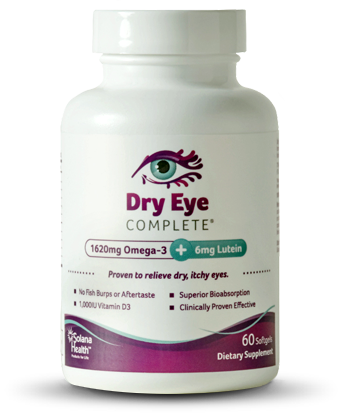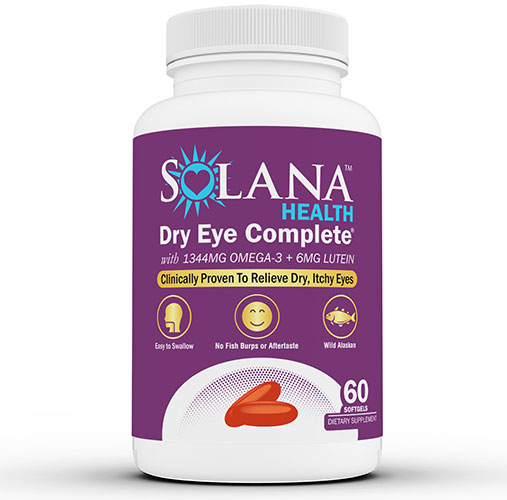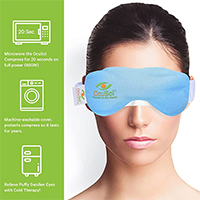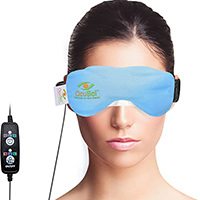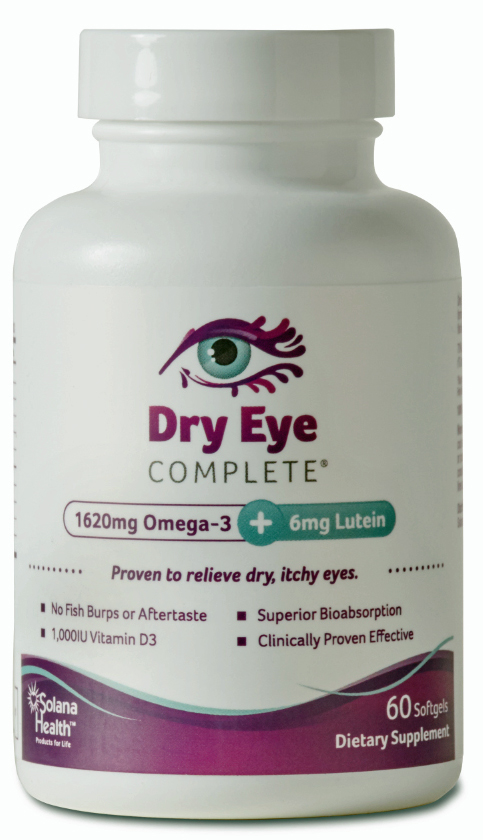When people have dry eye syndrome (DES), it means that their tears are not of a good enough quality to be able to nourish and lubricate the eye. Tears are responsible for ensuring the surface of the eye is of good quality, so that vision can be clear. DES, unfortunately, is a very common condition and older people in particular often suffer from it chronically.
How Tears Work
When we talk about tears, most people think about crying. While that is certainly one of the effects of tears (when so many stream out of our tear ducts that they literally overflow and roll down our cheeks), tears are actually produced each time we blink. When you blink, the Meibomian glands (around 20 to 30 of those are found on both the upper and lower eyelid) are squeezed and they release an oily substance. The tear then spreads over the cornea (the front part of the eye), and lubricates it. In so doing, the chance of eye infections is reduced, any foreign matter in the eye is washed out and the eye’s surface itself remains clear and smooth. Tears are flushed away from the eye through the tear ducts, going to the back of the nose.
Dry Eye Syndrome
Dry eye syndrome is a blanket name for a number of possible problems. Often, people suffer from all of these problems at the same time:
- Production and drainage of tears is not balanced.
- The Meibomian glands are dysfunctional, meaning there is insufficient lubrication in the eye.
- The tears contain too much or too little aqueous (watery) substances.
- Tears evaporate too quickly.
- People do not produce enough tears.
Most commonly, DES is caused by an inadequate amount of tears. As we age, our production of tears also lowers. Other factors that can cause this include certain medications and the environment. If you live in a very dry environment, be that inside your home or office or because of the climate, you are more likely to develop DES. This can also happen because tears simply evaporate too quickly.
A second common reason is that the quality of the tears is very poor. A tear consists of oil, aqueous substance and mucus. The oil stops the water from evaporating and the mucus spreads the tear over the eye. When any of those three elements is disrupted, DES can develop. There is often no specific reason behind why this happens. Through research, we known that the most common form of DES is an inadequate supply of water layer. This is known as keratoconjunctivitis sicca (KES).
Effects of Dry Eye Syndrome
As previously stated, DES tends to be a chronic condition. Often, it also gets worse over time. At first, you may feel like there is something inside your eye, experiencing grittiness, irritation, burning and itching. As DES progresses, the front surface of your eye may become damaged, at which point you could also start to suffer from problems with your vision. However, it is incredibly rare for DES to actually lead to blindness. If properly treated, which means the amount and quality of tears is restored, these problems tend to go away as well. Eye health can then also be fully maintained, meaning no vision loss has to be experienced.
Most people experience DES in both eyes. The most common ones include:
- A scratchy, burning or stinging sensation in the eyes
- Developing a mucus around or in the eyes
- Being sensitive to light
- Having red eyes
- Feeling like there is a foreign body inside the eye
- Struggling to wear contact lenses
- Finding it hard to drive during the night
- Experiencing watery eyes, caused by the body trying to lubricate your eyes again
- Eye fatigue
- Blurred vision
It has also been known for people to ‘cry’ as a result of DES, meaning tears run down their cheeks. This is often confusing to people, as they presume dry eyes means that the eyes themselves are dry. Usually, when people have a surplus of tears, it means their eyes are no longer lubricated. The eye then tells the nervous system that it is in distress and the response is to try and lubricate it more. However, the reason why the eye is dry in the first place is because the tears do not contain enough lubrication so, while the response of creating more tears is normal, it is not actually beneficial. The surface of the eye will still not be coated with the right amounts of mucus and oils. Instead, the eyes have to be given a chance to regenerate from whatever caused the dry eye in the first place.
Long Term Effects of Dry Eye
If dry eye progresses for a long period of time, the cornea (the front part of the eye) may become severely irritated. It is also far more likely for someone to develop an infection in the eye, because the tear film is no longer able to protect it properly from bacteria. Unfortunately, as the risk of infection goes up, so does the chance of developing a visual impairment. While it is rare for people to experience any permanent loss of vision, the longer DES is left untreated, the bigger the chance for the cornea to become scratched and lead to irreversible damage.
This is why it is so important to have your eyes checked regularly. The table below highlights how often people should have an examination as standard.
| Age | How Often You Should Get Checked |
| Babies up to 24 months | First check between 6 and 9 months of age |
| Children aged between 2 and 5 | At least one examination should be performed |
| Children aged between 5 and 19 | One examination per year should be performed. |
| Adults aged between 20 and 39 | One examination every two to three years should be performed. |
| Adults aged between 40 and 64 | One examination every two years should be performed. |
| Adults aged 65 and over | One examination per year should be performed. |
Besides regular eye examinations, however, you should also learn to listen to your eyes. Despite them being one of our most used and important organs, we don’t look after them very well. We also have a tendency to self-diagnose and self-medicate. While the treatment we give ourselves is the right one almost every time, the eyes are simply too precious to gamble with.
Almost always, DES is at the heart of eye problems. However, a physician or ophthalmologist should still look at it to determine exactly what is causing your DES. In so doing, they will also be able to determine the best course of treatment. Many treatment options are over the counter remedies, but they will be able to give you advice on which ones will work best for you. For instance, some over the counter remedies contain preservatives and these can actually make DES worse over time.
In around 86% of people suffering from DES, treatment recommended by an ophthalmologist or physician – even if it is an over the counter remedy – is effective. However, as it is often a chronic condition, it will come back again and again. It is important to seek medical advice each time, just in case it is something else.
Emotional Effects of Dry Eye
One thing that many people don’t think about is just how DES affects people on an emotional level. Some research has been done into how having pain and discomfort of the eye affects people, which has been found to be quite negative. In fact, mental health was quite significantly impaired. This is why people who do suffer from DES should also speak to a medical professional and talk about how the condition actually makes them feel on a psychological level.
Some of the things that people with DES struggle with in particular include:
- An inability to perform certain tasks, making them feel less of a useful member of society. Working behind a screen and driving are common examples.
- An inability to enjoy previous hobbies, which means they can be bored and lack direction in their life. Examples include reading and puzzling, although a magnifying glass can help with this.
- A feeling of embarrassment, particularly if their eyes become red or if they experience tears running down their face.
- A feeling of impending doom, as DES is often associated with aging
The above feelings are very important to recognize and deal with. Physicians are now encouraged to provide more education and awareness about dry eye syndrome, how it can affect people and how they can seek help. Without it, people may find themselves becoming increasingly socially isolated, with a potential escalation into depression and other mental health conditions.
Resources and References:
- Facts About Dry Eye – Information on dry eyes. (National Eye Institute)
- Impact of Dry Eye Syndrome on Vision-Related Quality of Life in a Non-Clinic-Based General Population – Study on effects of dry eye on quality of life. (BioMed Central)
- Dry Eye Disease: Impact on Quality of Life and Vision – Effects of dry eyes on quality of life and vision. (NIH.gov)
- Development and Validation of the Impact of Dry Eye on Everyday Life (IDEEL) Questionnaire, a Patient-Reported Outcomes (PRO) Measure for the Assessment of the Burden of Dry Eye on Patients – Study on the impact of dry eyes on quality of life. (BioMed Central)
- Frequency of Ocular Examinations – 2015 – Information on frequency of eye examinations (American Academy of Ophthalmology)

